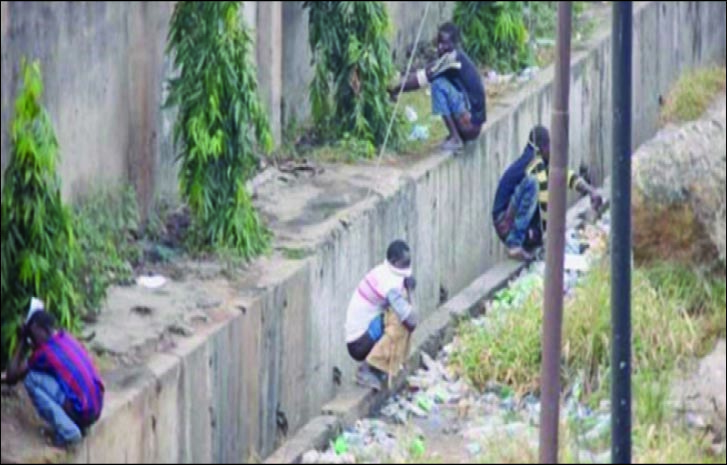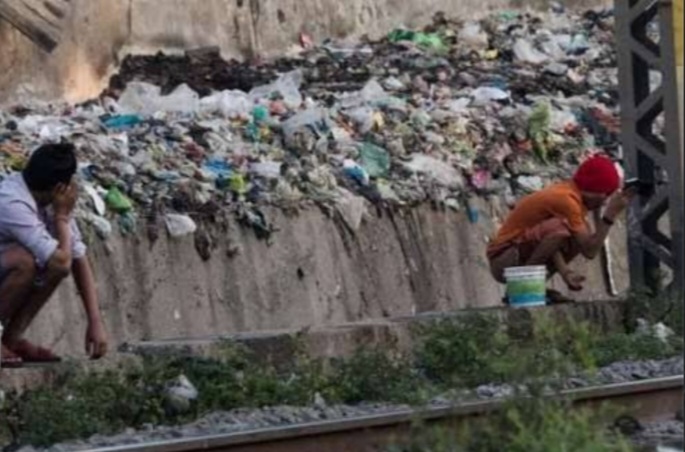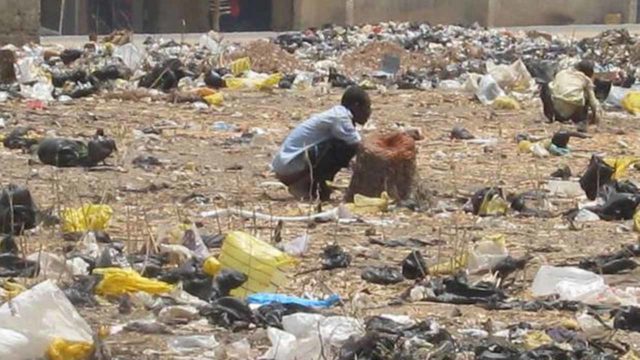Insights on Lagos State’s 2025 ODF agenda

By Femi Akinola
I was standing under the Agege flyover recently waiting for a commercial bus that ply Agege to the seat of Lagos State Government at Alausa, Ikeja, and I am pressed. I looked around and I couldn’t find a place to ease myself. I looked hard.
This area is one of the numerous densely populated part of Lagos. Everyday, people have the same experience like mine across major populated areas in the mega city.
A related incident happened mid-last week. My destination is Lagos Island. It was around midday at Ebute-Ero area of the Island. I saw a wheelbarrow pusher pushed his wheelbarrow to the edge of Eko Bridge and stopped. He later pulled down his faded jeans trouser to defecate in the lagoon.
Some motorists sped past but he was not bothered whether they are looking at him or not. He bend down and defecate right there in the open. He felt relieved after he emptied his bowels into the lagoon.
What relaxed the wheelbarrow pusher was the realisation that he was able to excrete the faeces which had inconvenienced to him. Few metres away from where he defecated into the lagoon, three other persons in tow run with quick light steps to answer the call of nature. Few minutes thereafter they have finished and walk towards the market place near the bridge.
I approached one among the three persons and asked him why he chose to excrete openly when there is a private toilet nearby? The young man said that at the public toilet over there (pointing to the direction of a private toilet standing over 100 metres away), he would need to pay N50 to urinate and N100 to defecate asking why he need to go and dash out money to handlers of the public toilet where there is a place near the lagoon where he could defecate openly without paying a kobo. He said he wasn’t ashamed to defecate in the open saying, ”Why will I be ashamed when I am not the only person doing it.”

According to him, many people on the Island defecate into the lagoon at different locations. He said open defecation is not a new thing in that part of Lagos. ”It is not new that many people shit in the lagoon here in Lagos. At night or very early in the morning around 5 am some shit at roadside, along the bridge and the lagoon. I have seen a car parked on the road here before the day break and a man rushed out of the car and defecate in the lagoon,” he said.
NatureNews investigations on open defecation in Lagos revealed that the city state lacks adequate conveniences and open defecation is rampant. One major glaring reason for continued open defecation in Lagos is the inadequate number of public toilets, sewage systems and influx of people from far and near into the mega city without a place to live.
Findings also revealed that majority of the existing public and private toilets across the commercial nerve of the country are poorly maintained or not easily accessible in some areas. The ratio of current population of Lagos and available public toilets owned by the state or private investors is unbelievable. What make the situation worse is the fact that thousands of residents in the city have no home where they live. Some live under bridge, inside market place, uncompleted buildings and in the open. This is precisely why open defecation is a major issue in Lagos.
Last December, the African Cities Research Consortium (ACRC), a multi-city research project submitted that the environment in Lagos stinks and that almost all the 20 Local Government Areas and 37 Local Council Development Areas in the state are not free from open defecation. This was contained in the Consortium’s report of the research titled Lagos City of Systems: ”Food Security, Health and Safety, Environmental Sustainability.” The researchers listed cases of challenges inhibiting conducive environment in Lagos just as it acknowledge efforts put in place by the state government to ensure Lagos is open defecation free by 2025.
On the Sanitation in Lagos which the researchers beamed their searchlight on, it was described as poor. The body of researchers emphasised further on the state of environmental sanitation in Lagos saying, there is no clear operational procedures, technologies, facilities and safety mechanisms in place to oversee sanitation work or workers, and workers have limited access to occupational health and safety protection measures. ”Despite official rhetoric, sanitation is not prioritised in the state. No local government area in the state has been declared open-defecation free,” the researchers submitted.
The Consortium’s City Lead and Professor Taibat Lawanson of the Urban Development and Governance at the University of Lagos (Unilag), explained that the body of researchers have worked assiduously over level of sanitation in Lagos in the last two years and have identified priority complex problems confronting the state promising that the challenges will be addressed through action research and advocacy over the next five years.
Why Open Defecation Persists in Lagos?
Lagos is the commercial nerve of Nigeria. It was the smallest state in size with territorial land area 351,861 hectares compare with other bigger states in the country. Lagos is the most populous city in Nigeria. In a book titled Errors, Miscalculations and Omissions: ‘The Falsification of Lagos Census Figures” published by Lagos State Government shortly after the 2006 Nigerian Census, the authority claim Lagos population is 17, 553, 924 as against the 9,013,534 population figure for the state released by the Nigerian Population Commission (NPC).

lnvestigations on open defecation in Lagos revealed that there are blighted areas in the megacity. The notable slum areas are Agege, Ajegunle, Amukoko, Badia, Iwaya, Makoko, Ilaje (near Bariga), Ijeshatedo, Itire, Mile 12, and others. These slum communities are home to about more than five million of people. Open defecation is a daily affair in these slum communities and it is done on places such as dumpsites, drainages, gutters, bushes, roadsides and any available place, particularly around market place.
In the blighted areas of the megacity, some residents openly defecates without caution in spite of the existing Lagos State Environmental Laws prohibiting such act. The slum communities are characterised by degrading environmental conditions including defective infrastructural facilities.
In these communities, environmental sanitation is a big challenge. Quite a lot of buildings in the slums communities are without toilets and occupants of houses without toilets resort to open defecation.
The influencing factors found out to be responsible for .an unending open defecation in Lagos is the norms and practices held from childhood by the people who still indulge in the act. Ignorance, force of habit, poverty, poor hygiene background, lack of water in many places and ineffective waste disposal system contributed immensely to continue open defecation in Lagos.
Checks on what the state government has done to ensure open defecation become a thing of the past in the state was the survey carried out by the government in 2012, on sanitation arrangement in the state. The survey indicated that 52% of the responders claimed they used flush to septic tank, while 26% said they flush to pit. The survey further show that 15% used covered pit latrine, 3% used uncovered pit latrine while 3% defecates in the bush.
Further analysis also showed that across the local government and local council development areas in the state, flush to septic tank toilet facility is common in Lagos Island as indicated by 70% of the sampled households followed by Eti-Osa with 65% attesting to its usage. The survey report also showed that flush to septic tank toilet facility is also commonly used in Surulere area with 64%.
Surprisingly, according to Lagos State Bureau of Statistics, bush and field are still being used by a few household across some of the local governments and the local council development areas in the state. This approach, the Bureau noted, takes place in some of the rural areas of the state, which lack full pit latrine coverage. The Bureau noted that in Ojo local government, 18% of the sampled households disclosed the use of bush and field toilet facility, 17% in Badagry Local Government Area and 10% each in both Ibeju-Lekki and Lagos Mainland respectively.
Sanitation experts pointed to the huge population in Lagos and said such densely populated city where millions of people are always on the road everyday and need to use toilet for their convenience, need more than 5,000 public toilets if Open Defecation must be a thing of the past in Lagos.
Corroborating Sanitation expert’s submission on the required number of public toilets that will conveniently be adequate for the teeming Lagos population, Shaibu Temitope, an environmentalist and advocate of a sustainable environment said that each Local Government Areas and Local Council Development Areas (LCDA’s) within metropolitan Lagos need more than 10,000 standard public toilets to cater for the ever increasing population of the city.
Government’s Efforts To Eradicate Open Defecation
The state government established regulations and hygiene programmes. Lagos State keyed into the action plan put in place by the Federal Government to end open defecation in the country by 2025. Government also inaugurated an Anti-Open Defecation Squad to arrest non-complying members of the public to be dealt with according to the dictate of the State Environmental Law.

In June 2023, Lagos State Government domesticated the Clean Nigeria: ”Use the Toilet Campaign” earlier launched by the Federal Government within Apapa Local Government Area of the state. Lagos also adhered strictly to the developed National Roadmap to achieve an open defecation free Nigeria in 2025. Moveable and immoveable toilets were made available at essential areas for convenience of the people whenever they are away from their house and pressed.
Private investors were also allowed to invest in provision of public toilets as a form of business. Consequently, scores of public toilets were built across the metropolis. Aside this, the state government directed all petrol filling stations and eateries in the state to provide a toilet in their premises for public use. As of 2023, the state government has built 1,200 facilities while the local government authorities and private investors have provided a little over 1,000 public toiles in which majority are mobile toilets.
As of November 24, 2022, the state government through the Ministry of Environment and Water Resources, conducted its second edition of training workshop for public toilet operators to build capacity for them as well as to ensure a cleaner, more hygienic and safer public toilet environment across the state. The Permanent Secretary, Office of Environmental Services, Dr. Omobolaji Gaji addressed the public toilet operators on the need to meet the 2025 target of eradication of open defecation in Lagos.
In spite of the existence of Environmental Law in Lagos, it is unfortunate that too many residents in Lagos are not making use of the existing public toilets put in place by the government and private investors even where it is free to be used. What is common in the city till the moment is that some residents still defecate in drainages, gutters, bushes, open field, and in the lagoon thwarting8 the state government efforts to eradicate open defecation in the state by 2025.
Open defecation and environment pollution is rampant in many parts of Lagos but that of Mile 12 in Kosofe Local Government Area in Lagos State is an eyesore. Accusing fingers of environmental pollution in the area are pointed at private toilets operators in the area. They are more concerned about making money than the health of the residents.
Findings in the area revealed that some of the public toilets around the Mile 12 market and adjoining neighbourhood are owned by traders and leaders in the market. Majority of the public toilets are made of wood on top of Maidan River. Users are made to pay N50 to defecate and N20 to urinate. Over a dozen of such public toilets are in place but it was discovered they don’t have sewage tanks. Sewage pipes from these wooden public toilets are connected to the Maidan River where residents do their washing and fishing, thus contaminating the water.
It was gathered that whenever it rains, the area gets flooded and faeces float on water and pollute the environment for the residents. A visit to Agiliti Road, Meidan Road, Oniyanrin Street and Oremerin Street in Mile 12 area is an indicator that open defecation free in Lagos come 2025 is like passing a camel through the eye of a needle.
There are other parts of the megacity where open defecation and environmental pollution is rampant particularly in communities that are close to a river or the lagoon. In such communities, residents usually defecates in the water. The communities include Ilaje, Bariga, Makoko, Iddo, Otto, Iyana-Iba, Lagos Island, Amukoko, Ijora, Alaba Rago and several others. Residents and workers at the popular Okobaba Sawmill, Ebute Metta, also engaged in open defecation. Majority of workers at the sawmill defecates in the lagoon.
Beside these places mentioned, it was discovered that even in areas that there is or there are public toilet facilities, many among Lagos residents still prefer to defecate in their potty and throw it into the gutter or defecate in an open space. In some areas, instead of using the public toilet built for their convenience by the government, some people will go and defecate in the open beside the facility. It is that so bad.
Commissioner for Environment and Water Resources in the state, Tokunbo Wahab is of an opinion that the challenge of Open Defecation in Lagos is not that of lack of provision of public toilets but the growing population of immigrants entering Lagos everyday, seven days a week, many who have no home to live. These set of residents in Lagos, according to the Commissioner, are the ones who defecate openly since majority of them could not even afford to rent a house nor pay for the use of public toilet that dotted the land.
An environmental sustainable advocate, Sesan Babajide, said that open defecation deteriorates the quality of drinking water in areas where the act is still being practice and that this will make the water within the area unfit for drinking purposes. The World Health Organisation (WHO), says globally, at least two billion people use a drinking water source contaminated with faeces.
According to him, fecal materials from the surrounding areas where open defecation is prevalent can increase the risk of flooding during the rainy season. He added that the act is capable of polluting Lagos beaches thereby decreases their potentials to attract local and international tourists.
In his own contribution, a medical doctor, Olaosebikan Salami, said that open defecation can influence severe health implications like spread of diarrhoea, intenstinal parasites, increase in child mortality rate, increases low birth weights and the spread of water borne diseases.
It was also gathered in the course of the investigations that Open Defecation can influence contamination of agricultural produce, pollution of underground water and increases the risk of flooding during the rainy season. A lack of adequate clean and safe public toilet can make women who defecates openly to rape and attack by criminally minded men loitering around.
